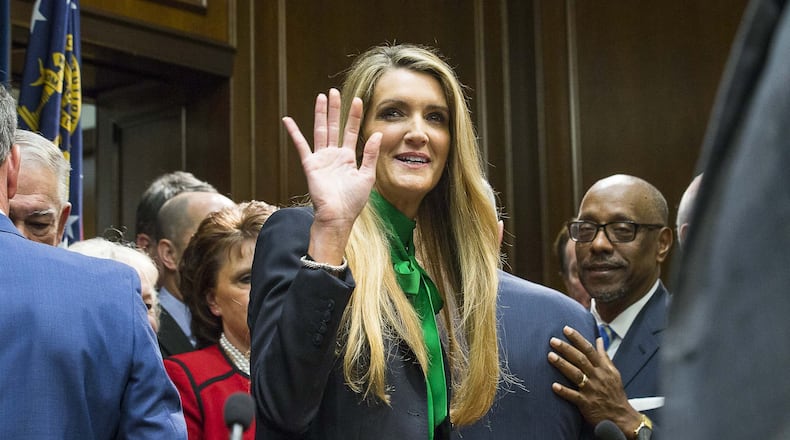Before Republican Kelly Loeffler emerged as Gov. Brian Kemp’s pick for a U.S. Senate seat, the powerful financial firm where she’s long served as a senior executive spent millions of dollars to lobby the congressional lawmakers she’ll soon join and the government agencies she’ll soon influence.
An Atlanta Journal-Constitution analysis of financial disclosures showed that Intercontinental Exchange, the Atlanta-based financial platform, has spent more than $17 million lobbying Congress and federal agencies since 2002.
The records from the Center for Responsive Politics show that Intercontinental Exchange's lobbying has put it among the 25 top-spending securities and investment firms since 2011. The company has also hired a team of advocates, including a former U.S. House staffer who drew a public rebuke from a powerful lawmaker.
Loeffler was a top marketing executive for Intercontinental Exchange, the massive financial trading firm, until 2018 when she became the head of a subsidiary of the company that deals with digital currency, such as bitcoin. Her husband, Jeff Sprecher, is Intercontinental Exchange’s top executive.
The lobbying expenses are a small fraction of spending from a company valued at more than $50 billion, and Loeffler said in an interview that she wasn’t involved in the decisions.
Her corporate ties have brought scrutiny over whether she'll serve on powerful committees that oversee the financial industry or cast votes on issues that could influence her husband's company or its subsidiary, the Bakkt digital currency firm she now runs.
Loeffler told the AJC she would abide by Senate ethics rules and transparency laws, and that she plans to step down from her role in the company and distance herself from its decisions. She would not say whether she would recuse herself from certain votes that could influence the business.
“I have not spent my life trying to get to Washington. I’ve stepped out of the private sector to serve Georgians out of gratitude to what our state means to me. With regard to any ethics, financial reporting or other requirements, I’m going to do it right,” she said.
“I’ll adhere to every ethics requirement,” she added. “I’ll meet the spirit and the letter of every ethics rule and law.”
Her lobbying expenditures have drawn the attention of watchdog advocates who have encouraged her to disclose her potential conflicts of interest and be transparent about her financial holdings.
“There are always perception problems in today’s political world when people seeking influence use their dollars, such as those who lobby for business interests, are appointed to government positions or public office,” said William Perry of Georgia Ethics Watchdog.
“Senator Loeffler will have a big challenge proving she represents the average Georgian because of the financial interests that she and her husband represent,” he said.
Loeffler could quickly face a test. Congress could vote next year to reauthorize the Commodity Futures Trading Commission, which regulates financial trading platforms and exchanges.
And she could also soon vote on a new commissioner of the Securities and Exchange Commission, whose lone Democratic member is set to step down. The SEC regulates the New York Stock Exchange, one of the Intercontinental Exchange's prized assets.
Lobbyist hires
Financial records show Intercontinental Exchange has hired several well-connected lobbyists including Alex Albert, a former top aide to Zell Miller when he was in the U.S. Senate, and Hope Jarkowski, who once worked for the Senate Banking Committee.
The team was led by Peter Roberson, who was for years the vice president of government relations for Intercontinental Exchange. As a staffer with the House Financial Services Committee, Roberson helped craft an overhaul that imposed regulations for the first time on credit derivatives and other opaque financial instruments.
His swift 2010 departure from the House to a senior role at Intercontinental Exchange, a company with an important stake in legislation he helped create, drew a sharp response from then-U.S. Rep. Barney Frank, who was chairman of the finance committee.
Frank, wary of the perception that staffers could land lucrative jobs with hefty salaries from legislation they helped design, banned the committee’s aides from discussing banking policy with Roberson.
"Fortunately, examples of staff members doing what Mr. Roberson has done are rare, but even one example is far too much," Frank said at the time about Roberson, who is now an executive with Charles Schwab.
“And that is why I wanted to make clear I share the unhappiness of people at this, and my intention to prohibit any contact between him and members of the staff for as long as I have any control over the matter,” Frank said.
Democrat Matt Lieberman, an Atlanta educator and entrepreneur who is running for the Senate seat in November’s special election, said the lobbying disclosures show Loefller is “not only part of the rigged system — she literally owns it.”
“But she doesn’t own this Senate seat. The people of Georgia do,” he said. “And it’s Georgians who will decide who they want representing them.”
Loeffler said she was prepared for scrutiny of her personal finances and her company’s decisions.
“I made a decision to serve knowing that these transparency requirements, and the need to resolve any conflicts, would apply from day one,” she said. “I’m spending a lot of time addressing these and taking it very seriously.”
About the Author
Keep Reading
The Latest
Featured




